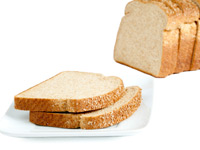There are many causes of canker sores, including physical trauma to the mouth, food allergies or sensitivities, nutritional deficiencies, hormonal fluctuations, immune system problems and stress, and heredity appears to be yet another factor. So if you get mouth sores, chances are (about 90% to be exact) your offspring will get them too.
They Are Not Alone
 Mouth sores are a very common problem; about 80 percent of the population has had one and about 1 in 5 get them regularly. Most of the time they are minor sores called recurrent aphthous ulcer minor. Most people start getting them around age 10, and the younger generation, i.e. teens and young adults, tends to get them most frequently, particularly girls. Females often seem to get them when they are menstruating, which lends some credence to the theory that for some it may be hormone related. If your child has braces, chances are they are going to get a canker sore if one of the wires rubs against delicate oral tissue. Dental wax or silicone can help prevent this. During exam time, when kids are stressed, is a common occasion for these sores to rear their ugly head.
Mouth sores are a very common problem; about 80 percent of the population has had one and about 1 in 5 get them regularly. Most of the time they are minor sores called recurrent aphthous ulcer minor. Most people start getting them around age 10, and the younger generation, i.e. teens and young adults, tends to get them most frequently, particularly girls. Females often seem to get them when they are menstruating, which lends some credence to the theory that for some it may be hormone related. If your child has braces, chances are they are going to get a canker sore if one of the wires rubs against delicate oral tissue. Dental wax or silicone can help prevent this. During exam time, when kids are stressed, is a common occasion for these sores to rear their ugly head.
Canker Sores Are Not Contagious
I want to emphasize that canker sores are NOT herpes cold sores. Unlike the herpes, which is caused by a virus and is highly contagious, mouth ulcers are not contagious, just darned uncomfortable.
Symptoms and Signs
Canker sores start out as inflamed red spots that turn into open ulcers with a white or yellow coating and a red border. Some people get a little forewarning and experience tingling or stinging at the site before the ulcer erupts. They can hurt like crazy, especially when eating or drinking, and even when talking – especially if they erupt on a really sensitive area like the tongue. In rare instances there may also be symptoms such as fever, lethargy or swollen glands, but this is not too common. The first several day are usually the worst, but it can take up to two weeks for mouth sores to heal completely.
Home Treatment
Most of the time, canker sore treatment can be managed at home. The main thing is relieving symptoms, in other words, reducing the pain. There are a number of over-the-counter options you can try. Ibuprofen can be effective in relieving the pain. There are topical treatments too. One of my favorites is Milk of Magnesia or Kaopectate mixed with a little Benadryl Liquid Allergy Medicine, then gently swabbed on the ulcer. This helps reduce the inflammation and makes it feel better.
There are lots of OTC medications made for treating mouth sores, especially numbing agents that temporarily relieve the pain. However in April 2011 the FDA issues a warning about a common numbing ingredient, benzocaine, saying it may not be safe for children. It could cause Methemoglobinemia which is an uncommon but serious medical condition that affects oxygen delivery to body tissues. You should use caution in using any medication containing an ingredient that ends in “caine” for this reason. This would include benzocaine, lidocaine and others. There is now a warning on all products indicating the product should not be given to children under two. It would be a good idea to check with your soctor before using a product containing this ingredient on your child.
Steps to Prevention
To help prevent future outbreaks, you may want to consider switching your child’s toothpaste to a formula that does not contain sodium laurel sulfate, which is a detergent foaming agent found in most toothpaste. There are several brands that carry SLS-free options including Jason PowerSmile and Tom’s of Maine which are readily available in drugstores and health food stores as well as online. Make sure your child practices good oral hygiene and that they brush their teeth at least twice a day. Check out that they are not brushing too aggressively, which can irritate the inside of the mouth.
If your child continues to get mouth sores, consider having your pediatrician check for possible food allergies, vitamin deficiencies or gastrointestinal issues such as gluten intolerance, as they may be a cause of the ulcers or part of the problem. Always check with your doctor if a mouth ulcer persists for more than two weeks or is so painful they are unable to eat or drink due to severe pain, or if they get them more than several times per year.



